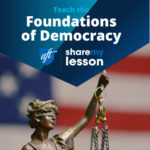Rule of law is a principle under which all persons, institutions, and entities are accountable to laws that are: publicly promulgated, equally enforced, independently adjudicated, and consistent with international human rights principles. The Administrative Office of the U.S. Courts has created this resource to help your students understand rule of law with an overview of the topic; opening discussion questions; relevant landmark case summaries; and discussion questions to check for understanding. In a Court Shorts video, nine federal judges explain how fair and consistent adherence to the law protects our rights and well-being in everyday situations.
Distance Learning: Civics for Civic Engagement in the Federal Courts
Distance learning activities become civics for civic engagement when federal judges bring the rule of law, separation of powers, judicial independence, and jury service into students’ daily life. Student voice is incorporated into every activity. Teachers and students can explore the pillars of literacy: rule of law, separation of powers, and judicial independence. With the guidance of federal judges and attorney volunteers in virtual court hearings, students learn and practice civil discourse skills as the foundation of effective dispute resolution in the law and in life.
The Rule of Law and Public Health: A Socratic Seminar
For this high school Socratic Seminar, students will be asked to examine various readings and videos on public health and the rule of law and then explore the question “What role does the law play in protecting our health?” Encourage students to be prepared, participate actively, use evidence, listen carefully, and ask thoughtful questions of their peers throughout the seminar. There are resources to explore several public health examples (e.g., clean water, coal dust, COVID-19) included in this seminar guide, so feel free to select one or more, and adapt to your needs.
Environmental Laws Timeline Activity
Students will have to select 25 environmental laws in American history from a much larger list. Their goal is to produce their own timeline of American environmental law history to present to the rest of the class. In doing so, they will develop critical thinking and analytic skills and articulate the importance of the Rule of Law to protecting the environment.
Court Shorts: Jury Service, Hands-on Justice
Jury service is an example of hands-on participation in democracy. In a five-minute video, 11 federal judges talk about jury service as an opportunity for citizens to be part of the judicial process that has an impact on daily life. The video, which deals with Constitutional principles and the practicalities of jury service, is part of the Court Shorts video series that includes installments on the rule of law and separation of powers.
Applying the Rules of International Humanitarian Law
Students learn about the concept of international humanitarian law, analyze photos, then use the chart of “Basic Rules of International Humanitarian Law” to discuss how the rules might apply to the people in each photo.
Foundations of Democracy
What are the three foundations of American democracy and how do they work together? Explore the National Constitution Center’s Foundations of Democracy learning module to uncover the connections between popular sovereignty, natural rights, and rule of law.
Foundations of Democracy: Lesson Plans & Resources

This Share My Lesson collection provides teachers with free lesson plans and resources on the foundational principles of democracies, including rule of law, limited government, and checks and balances. It can be used to build background knowledge to analyze the health of our democracy over time and in today’s environment.
Judicial Independence: Essential, Limited, Controversial
In a constitutional system of government, the role of the judiciary is essential for maintaining the balance of power, protecting individual rights, upholding the rule of law, interpreting the Constitution, and ensuring equal justice for all. In this lesson, students learn about the role of an independent judiciary in the United States.
Civic Friendship: ‘I Am Rooting Hard for You’
“You will be our President when you read this note. I wish you well. I wish your family well. Your success now is our country’s success. I am rooting hard for you.”
It doesn’t sound like a note that a politician would write to the man who had just defeated him in a hotly contested election for the highest office in the nation just a few months prior, yet these are the exact words penned by President George H.W. Bush to his successor, newly inaugurated President Bill Clinton, on January 20, 1993. Many of the tributes to the former president recounted the story of this note as evidence of the character of the man, of his grace and humility. In this eLesson, students will explore the importance of character traits like humility and respect in the individuals who hold public office and how commitment to the rule of law has sustained the executive branch throughout the country’s history.